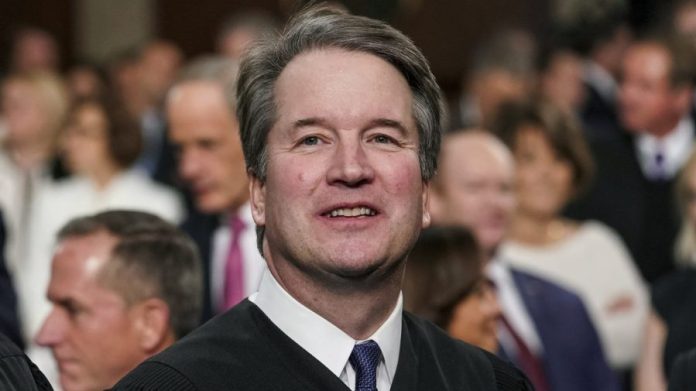
Conservative Supreme Court Justice Brett Kavanaugh defended the Supreme Court’s handling of emergency appeals brought by President Trump’s administration, rebuffing criticisms from those who argued the court is not offering enough explanations in its decisions.
“There can be a risk, in writing the opinion, of a lock-in effect, of making a snap judgment and putting it in writing, in a written opinion that’s not going to reflect the final view,” Kavanaugh, a Trump appointee, said Thursday at a Kansas City, Mo. judicial conference attended by lawyers and judges, according to multiple news outlets.
Trump’s lawyers have flooded the Supreme Court’s emergency docket, filing 21 emergency applications, tallying up more appeals to the nation’s highest court than former President Biden did during his four years in the Oval Office.
The administration has appealed cases related to Trump’s immigration directives and his administration’s firings of members of independent federal agencies.
In the vast majority of those cases, Trump has come out with a win. Cases on the Supreme Court’s emergency docket are decided quickly, without oral arguments and often contain no explanations.
“We have written a lot more than we’ve written in the past on the interim orders docket,” Kavanaugh said at the conference hosted by the U.S. Court of Appeals for the 8th Circuit.
Kavanaugh shared his views in a conversation with U.S. District Judge Sarah Pitlyk, who used to be his law clerk when he was a federal appeals court judge.
When asked about the hike in emergency appeals, Kavanaugh placed the blame on both major political parties for “increasingly trying to issue executive orders and regulations that achieve the policy objectives of the president in power.”
“And I think presidents, whether it’s President Obama – I think the phrase was ‘pen and phone’ – or President Biden or President Trump, have really done more of that, and those get challenged pretty quickly in court,” the Supreme Court justice said,
Kavanaugh, along with Amy Coney Barrett, warned previously that explanations of their preliminary thinking may “create a lock-in effect” as a case moves forward.
Liberal Supreme Court Justice Elena Kagan said last week that the nine Supreme Court justices should do more to explain their reasoning when tackling cases on the emergency docket.
“I think that we should hold ourselves, sort of on both sides, to a standard of explaining why we’re doing what we’re doing,” she said.

